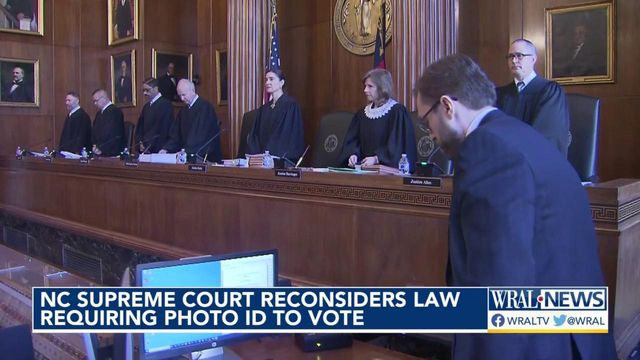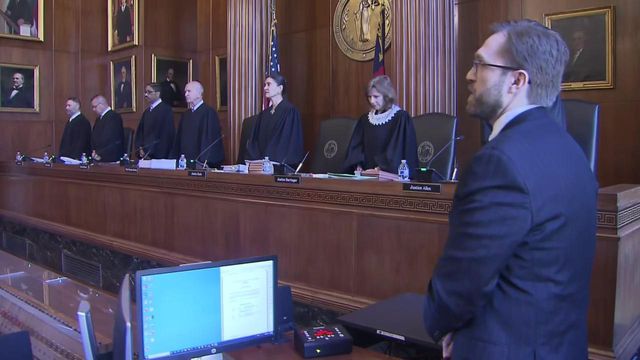NC Supreme Court reopens voter ID case after giving gerrymandering lawsuit a do-over. Are politics at play?
A day after rehearing a gerrymandering case that Republican lawmakers lost last year, the state Supreme Court took up another case — voter identification — that the GOP also lost.
One disagreement between the court's Democratic and Republican justices is whether a law like voter ID can be called racially discriminatory even if it had support from a small number of Black lawmakers, and if none of its white supporters made explicitly racist statements backing it.
“North Carolina also has a long history of race discrimination generally and race-based voter suppression in particular,” the court’s ruling last year said. “Although laws that limit African-American political participation have frequently been race neutral on their face, they have ‘nevertheless had profoundly discriminatory effects.’ Thus, equal access to the ballot box remains a critical issue in North Carolina.”
As in the redistricting case, the unusual decision to rehear the voter ID case has drawn considerable scrutiny. The court’s decision to rehear the cases came soon after Republicans took back the majority on the court, a development that has led Democrats to accuse Republican justices of partisan politics on the bench.
Republican lawmakers say that, if anything, the political actions from the court already occurred — when a Democratic majority ruled against them. And they were aided in that argument Wednesday by their fellow Republicans on the Supreme Court.
During Wednesday's oral arguments, challengers to the voter ID law criticized GOP lawmakers for rushing to pass it into law in a lame-duck session after the 2018 elections, just days before they lost their veto-proof supermajority. But the same criticism could also be applied to last year's last-minute ruling from the then-Democratic Supreme Court majority, Republican Supreme Court Justice Phil Berger Jr. suggested Wednesday. Several other Republican justices, including Chief Justice Paul Newby, made similar remarks.
Berger wrote the dissent in the voter ID case last year, in a ruling that came down along party lines. The court's Democratic majority issued the opinion in December, just days before Republicans flipped control of the majority. If the ruling had waited until this year, it would've been a Republican majority ruling on the case instead.
But with the Republican justices' decision to redo the case now, that's essentially what's happening anyway.
Is voter ID racist?
Berger — whose father is the leader of the state Senate and a lead defendant in the case — handled much of the questioning Wednesday. He largely used his time to question the logic of the decision striking down voter ID for racial discrimination.
The decision rests on a finding that the legislature, led by the elder Berger and Republican House Speaker Tim Moore, wrote the voter ID law intending to use it to make it harder for Black voters to cast a ballot.
Two versions of North Carolina’s voter ID law, from 2013 and 2018, have been ruled unconstitutional — and for the same reason: Judges, in both state and federal courts, have ruled that GOP leaders purposefully targeted Black voters.
Republicans dispute that.
"What's the direct evidence of that?" asked Republican Justice Trey Allen of Paul Brachman, the lawyer for the Black voters challenging the law as racially discriminatory.
Brachman said they're not claiming any lawmakers gave a public speech calling on Black people to be stopped from voting — "We are fortunately well past the time where we expect to find blatant statements of racially discriminatory motive in the legislative record," he said.
Just because politicians don't say racist statements out loud, Brachman added, doesn't mean their actions can't still have discriminatory effects.
The Republican justices who spoke Wednesday didn't appear convinced.
The court's two remaining Democrats, Michael Morgan and Anita Earls, who are both Black, continued backing the conclusion they came to in last year's ruling, which Earls wrote.
- After Allen said he didn't believe the legislature could've possibly passed a more permissive voter ID law, Earls cut in and offered several examples of rules in other states that North Carolina would not have, if this law goes into place.
- Morgan said he sees evidence of racial discrimination in the fact that Republicans chose specifically to not allow public assistance IDs as proof of someone's identity, since Black people are disproportionately more likely to have those types of IDs.
When Republicans originally passed voter ID in 2013, they looked up racial data to help them determine which IDs they should allow, or not, in order to specifically and purposefully target Black voters. And the 2018 law, Brachman said, was largely the same as the 2013 law, with many of the same people voting for it.
But there was a key difference from the 2013 law to the 2018 law, said Peter Patterson, the lawyer for Republican lawmakers.
He said the new version makes it easier for people without an ID to cast what's known as a provisional ballot. Instead of being turned away for lacking an ID, they'd be allowed to fill out a ballot that would only be counted if they later came back and proved their identity.
The challengers have argued that Republicans want to discriminate against Black voters because almost no Black people vote for Republicans, so stopping them from voting will strengthen the GOP's grip on power in state that's nearly 25% Black.
But if Republicans actually wanted to stop Black people from voting through voter ID laws, Patterson said, they wouldn't have included rule allowing anyone without an ID to cast a provisional ballot instead of simply being sent home.
"The only way that that works is if that if individuals are actually prevented from voting," he said.
Voter fraud extremely rare
Supporters of voter ID say it's needed to protect against voter fraud. If Republicans end up winning this case now that it’s being reheard, it’s possible that voter ID could be implemented in time for the 2024 elections.
A state-run audit after the 2016 elections found that even if every single allegation of voter fraud was true, there was only one instance of in-person voter impersonation — the type of fraud voter ID is intended to stop.
In that case, a woman from Catawba County impersonated her dead mother to cast an illegal vote for Republican candidate Donald Trump. She admitted to it in writing when contacted by investigators. The local prosecutor, a Republican, later declined to charge her.
Voter ID initially passed in 2013, signed into law by then-Gov. Pat McCrory, a Republican. It was ruled unconstitutional in 2016, after challengers proved that state lawmakers used racial voting data to intentionally target Black voters with the new rules.
For people who don’t have a driver’s license — a small percentage of the population, but not zero — the law banned types of IDs that Black people were more likely to have while allowing types of IDs that white people were more likely to have.
That fact, combined with other changes like eliminating the days of early voting that Black voters tended to use more frequently, led to the U.S. Court of Appeals for the Fourth Circuit calling the racial motivations of the 2013 law “as close to a smoking gun as we are likely to see in modern times.”
Legislative leaders passed another voter ID law in 2018. They made some changes, saying they hoped that would help the bill avoid being struck down again. And it was backed up by a state constitutional amendment that voters passed that same year — but whose legitimacy is also an unresolved legal question, still winding its way through the state courts.
The new voter ID law was immediately blocked from going into effect due to multiple lawsuits. After several years of litigation the state Supreme Court ruled it unconstitutional late last year, for the same racial discrimination reasons as the 2013 law.
Republicans were apoplectic — and referenced the fact that when they asked the general public to choose whether voter ID requirements should become a state constitutional amendment, it received 55% support.
“If Democrats on the state Supreme Court can’t respect the will of the voters, the General Assembly will,” Senate Leader Phil Berger wrote, adding that the legislature would quickly get to work on a third attempt at voter ID: “I look forward to respecting their wishes and passing a new voter ID law next year.”
Now that Republicans have retaken power on the court, they have the opportunity to reverse that ruling. If they do so after Wednesday’s hearing, then lawmakers likely won’t have to pass a third version of voter ID after all.
The 2018 version of the law could go into place — although there are two other lawsuits that could still stop it. One, in federal court, challenges the law itself. The other, in state court, challenges the constitutional amendment that voters approved that serves as a backstop for the law.
In that amendment case, the state Supreme Court ruled — again, last year and in a 4-3 party line decision from the Democratic majority — that the amendment was likely wrongfully put on the ballot because a number of the lawmakers who supported it only were elected due to unconstitutional racial gerrymandering earlier in the decade.
However, that ruling wasn’t final and the case has gone back to trial for further deliberations.













